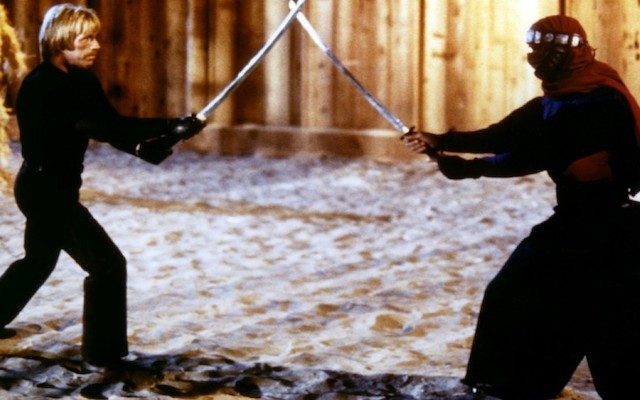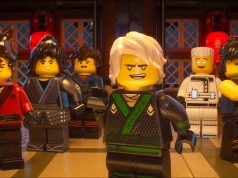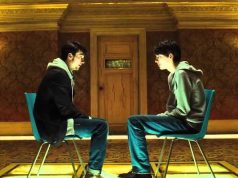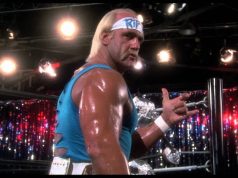
As you no doubt inferred from the title, “The Octagon” is about Chuck Norris saving his friends from terrorist ninjas. What else would you call a movie like that besides “The Octagon”? The film came early in Norris’ career, and helped establish his onscreen persona as an unconquerable hero who can vanquish any foe except acting (acting is his kryptonite). But the film was probably most cherished by the person who got to turn the “O” in “Octagon” into an actual octagon in the opening titles. For a graphic designer, that’s the chance of a lifetime.
Norris plays Scott James, an excitingly named former karate champion who retired from competition out of guilt for nearly killing an opponent. (In other words, Scott’s problem is that he was too good at fighting.) Now he makes his living by beating people up freelance and having a mustache, both of which he is very good at. After watching a dance recital with his lithe, fluffy-haired karate friend A.J. (Art Hindle), Scott goes up to the ballerina and says, “I enjoyed your performance,” whereupon he is instantly her boyfriend. A.J. looks on in amazement at Scott’s implacable charm.
The dancer, Nancy (Kim Lankford), is distracted at dinner because of an assassination that took place overseas, to which she has some kind of connection. Scott expresses concern for her by continuing to have the same dopey smile on his face that he always has, and by speaking in a somnolent monotone such as that favored by hypnotists. When he drives her home afterward, he senses that there are intruders in her house, and sure enough: ninjas. Call the exterminator, you’ve got a whole swarm of ’em! Scott fights and kills them all, of course, but not before they kill Nancy.
Here the movie introduces its most unintentionally comical element: Scott James’ internal monologue. We hear his thoughts. To make it clear that they are thoughts and not things that are being spoken aloud, the movie makes them echo. “Ninja!” his brain tells him, reverb cranked all the way up. “It has to be. But they don’t exist anymore! They CAN’T exist!” This is the first of many intense debates that Scott will have with his brain.
The thing I want you to remember is that when Chuck Norris thinks something, it echoes inside his head.
The reason Scott can’t believe it’s ninjas is that there’s only one person in the world capable of training them, and it’s his brother, Seikura, a Japanese guy who’s not really his “brother” but whom he grew up and practiced karate with. Scott’s mercenary friend, McCarn (Lee Van Cleef), is even more skeptical. He talks about “ninjas” like they’re unicorns or werewolves. NO WAY IT COULD HAVE BEEN NINJAS!!
What the movie fails to explain (well, one of many things the movie fails to explain) is what it was about the guys in Nancy’s house that makes Scott so sure they were ninjas. They were just sinewy martial artists in black clothes, barely discernible from your garden-variety mimes. As far as was demonstrated to us, the viewers, they possessed no extraordinary skills or techniques before Scott single-handedly defeated them. If I were Scott’s brain, this is the conversation I would have had with him:
SCOTT: They must be ninjas!
SCOTT’S BRAIN (ME): But ninjas don’t exist anymore; only one person in the world knows how to train them; and these guys didn’t do anything ninja-like.
SCOTT: Hmm. You’re right. Never mind.
As it happens, of course, Seikura IS training ninjas. He has a secret camp in Central America where lowlifes and ne’er-do-wells come from all over the world to learn the ancient art of, uh, being really quiet, and punching and kicking people while wearing black. Look, I don’t know what ninjas used to do that made them so awesome. But neither does the movie, and I would argue that the obligation to know something about ninjas lies more heavily on a movie about ninjas than it does on me. Seikura’s camp looks like an ordinary military boot camp, with guys in workout clothes sparring in dirt fields and jumping to attention when the sergeant comes by. The place is ninja-themed, I guess, but only in the decor. I don’t see how you’d learn real ninja stuff here any more than you’d learn how to really joust at Medieval Times.
Back in the U.S., Scott meets a rich lady named Justine (Karen Carlson) who’s been pestered and threatened by sinister forces. Knowing of Scott’s reputation as a fighter, a lover, and a mustache-haver, she tries to hire him to kill the person who’s targeting her, who it turns out is Seikura, Scott’s Japanese brother and trainer of ninjas. Scott says he will not do this, no ma’am. In fact, he’s a little offended that she would even ask, especially since she already tried (and failed) to hire two other mercenaries to do it:
SCOTT: What was your plan in my case?
JUSTINE: Well, I had hoped to entice you into taking a personal interest in things.
SCOTT: That’s an insult to both of us. It makes me stupid, and you a whore.
Scott James: karate expert; ninja hunter; ladies’ man.
Undaunted, Justine takes up with A.J., who is more gullible than Scott is, and whom she successfully convinces to find and kill Seikura. As soon as he heads off on this mission, Justine gets worried about him and tells Scott what she’s done. Scott, who knows that even HE would have a hard time defeating Seikura, and that there’s no way someone who isn’t him could do it, now has to rush after A.J. to save him. For her troubles, Justine is killed by a ninja-terrorist-assassin with a blow dart.
That’s two women dead, one to go! The third is Aura (Carol Bagdasarian), a raven-haired beauty who was training at Camp Ninja until she became disillusioned and fled, like a quitter, like a big baby quitter. Now she wants to help Scott take the whole operation down, and she’s willing to show him where the camp is. The location is a source of great mystery. A.J. is shown pestering a series of sketchy informants just to find out what country it’s in. A lot of people know, evidently, and A.J. knows who knows, and each person will tell him which person to ask next, but nobody will actually tell him. It’s like a big, dumb scavenger hunt.
I should mention that there is a brief scene where Scott’s former manager tries to get him to return to competitive karate. He refuses. His brain tells him, “Stop thinking about that” — to which I would have responded, “Listen, brain, you’re the only one doing any thinking here.”
It is possible that what we’re hearing isn’t Scott’s brain at all but an entirely separate personality, one who argues with Scott and echoes.
Anyway, A.J. finds his way to Ninja Camp and is immediately captured. Like, instantly, the very second he arrives. Aura and Scott aren’t far behind, but Scott won’t let Aura raid the camp with him, even though she would be useful and it would help her atone for the guilt of having trained there herself. Scott is a selfish slab of meat who doesn’t want to share his heroism with anyone other than the voice in his head.
Aura follows him anyway, naturally. As he sneaks in, Scott’s brain asks him if he’ll be able to kill Seikura when/if the need arises. Scott lets the question hang there, allowing his brain to have the last word as usual. Then he fights like a hundred ninjas (whose training is revealed to have been shockingly substandard given the level of secrecy and prestige surrounding this place) before facing Seikura’s enforcer, a masked figure whom Scott sets on fire and then slices in half with a sword. This takes place in a big wooden octagon, hence the scintillating title.
Then, finally, Scott battles Seikura himself. A flashback showed us how they became enemies years ago, but it was dumb so I didn’t mention it. (Fine: Seikura got jealous of Scott’s awesomeness, so their father disowned him and ordered Scott to consider him an enemy thenceforth, secondhand grudges being common among practitioners of ancient martial arts.) Remember how Scott wasn’t sure he’d be able to kill Seikura when the time came? Yeah, turns out it’s pretty easy, the end, roll credits.
All of the acting in the film has a community-theater vibe to it, as if a bunch of accountants and dentists and retail clerks got together to make the stupidest movie they could think of for as little money as possible. For all I know, that’s exactly what did happen. You can see why Chuck Norris became a cool action star, though. He’s good at killing people, his mustache holds the secrets of time and space, and his thoughts reverberate audibly off the walls of his skull — the very traits our society prizes above all others. If anyone can save us from thin, silent warrior-mimes, it’s him.
— Film.com





